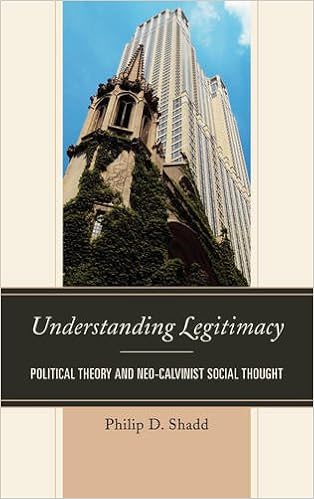Political Theory and Neo-Calvinist Social Thought
Philip D. Shadd
Lanham, MD: Lexington Books
ISBN: 9781498518963
Hbk, £54.95, pp viii+207
Publisher's website
This book addresses an important but the often ignored question of the legitimacy of political power. Shadd examines it from a philosophical perspective. By legitimacy, he means, in part, what constitutes the use of political power legitimate even if it is imperfectly implemented?
One approach to legitimacy is justificatory liberalism as epitomised by the work of John Rawls. Justificatory liberalism grounds legitimacy in a version of popular sovereignty. In essence, justificatory liberalism holds that coercive power is legitimate if it is based on reasons that all reasonable people can accept.
Shadd critiques justificatory liberalism and develops a fresh perspective utilising the fruitful approach of neo-Calvinism. He proposes that political theorists ‘mine neo-Calvinist through for conceptual insights’ (4). He sees the neo-Calvinist approach as a ‘reservoir of conceptual insights and resources from which political theorists can, and should, draw’. I agree - but I’m not sure that in the current highly polarised political climate such views would be welcomed. It certainly provides a more biblical approach than the almost consensus of justificatory liberalism.
Shadd’s key question that he seeks to answer is 'what is the right framework for thinking about political legitimacy?' (76). He finds justificatory liberalism wanting and looks towards the rich resources of neo-Calvinism. He expertly shows the flaws in justificatory liberalism and that it leads to unacceptable consequences. He aims to provide a better philosophical framework from which to understand the conditions that provide for political legitimacy (77, 181).
He provides a helpful general overview of the neo-Calvinist perspective in nine tenets. These provide a useful outline for a neo-Calvinist political framework. The nine tenets are as follows.
Tenet 1 all people are equal, naturally free, and ultimately accountable only to God.
Tenet 2 All are commissioned to sociocultural development, renewal, and transformation
Tenet 3 There is something unnatural about coercive political power. It is only necessary "by reason of sin."
Tenet 4 Sociological renewal ought be pursued along the lines of divine creation order
Tenet 5 The normative creation principles for culture and society are accessible to all (not only believers).
Tenet 6 Society is composed of different spheres, and each ought be free within its respective domain.
Tenet 7 The state ought be superset from the church (and other religious institutions).
Tenet 8 The purpose of the state is public justice.
Tenet 9 All reality is ultimately ordered by God and all human authority ultimately delegated by God.
From these tenets he begins to develop a neo-Calvinist approach to legitimacy and shows that such an approach provides a better understanding of political legitimacy than the one offered by justificatory liberalism. The state is to uphold laws that protect the basic dignity and interests of all, to prevent basic wrongs, but also to enable basic human flourishing and to represent a normative standard.
This book works on many levels. It provides a brilliant critique of justificatory liberalism, exposing its many flaws, and it illustrates the rich resources of the neo-Calvinist perspective for politics. It provides a great example of how to debate with political theories from a Christian perspective. I hope it will be widely read and not just by neo-Calvinists.


No comments:
Post a Comment